
Thousands of British Columbian men and women bravely signed up to fight against enemy forces or serve as nurses and personnel abroad during the First and Second World Wars.
Although no blood was shed at home in Vancouver, the history of the war clearly left its mark on the growing metropolis.
See also
- TransLink releases special-edition Compass Cards for Remembrance Day
- 34 ceremonies in Metro Vancouver for Remembrance Day 2018
- Opinion: Here's why I'll be attending a Remembrance Day ceremony this year
- Opinion: I'm anti-war – but I'll still attend a Remembrance Day ceremony
- Over 3,000 poppies installed by students at Vancouver City Hall
- Millennials more likely to attend Remembrance Day events than anyone else in Canada
Sunday’s Remembrance Day events will commemorate the 100th anniversary of the end of the First World War.
Here is a quick look through some historic photographs capturing Vancouver city life during WWI and WWII.
The First World War
Soldiers, family, and friends crowd outside the Vancouver C.P.R. Station (not pictured) in 1914 as the first troops depart to Europe. Location: Southwest corner of West Cordova Street and Seymour.
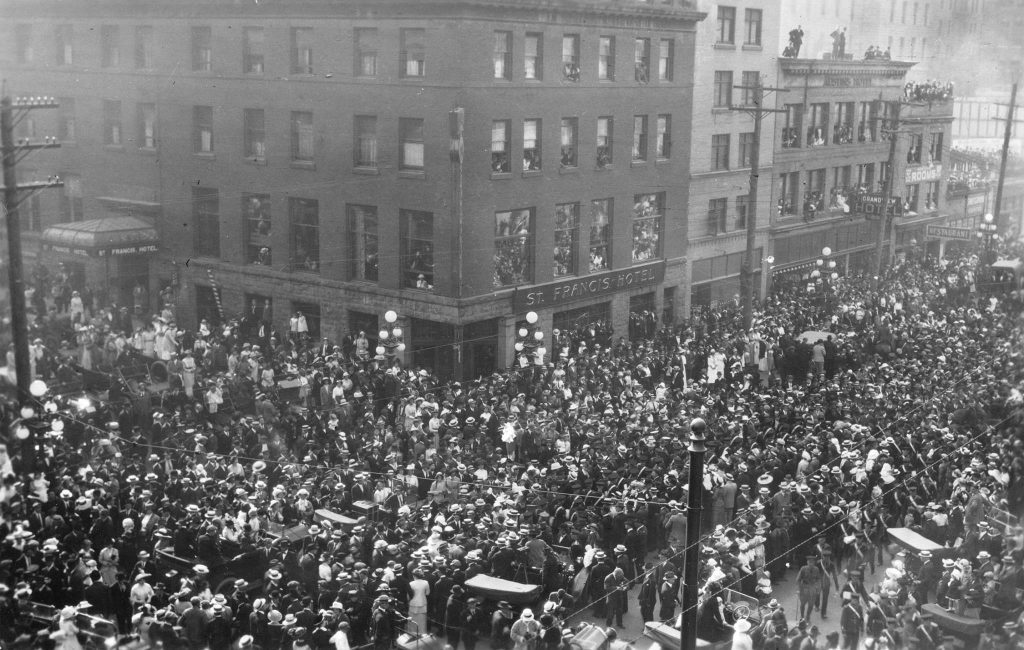
Vancouver City Archives
The 29th military departure leaves Vancouver by train at the start of the Great War in 1914.

Vancouver City Archives
Crowds wave goodbye to the departing troops at the C.P.R. Station in 1914.

Vancouver City Archives
“A free round trip to Berlin” – Soldiers stand out front of the 131st Battalion C.E.F. Recruiting Office in 1916, optimistically advertising a free round trip to Berlin in exchange for military service. Location: 205 Carrall Street, next door to current Six Acres location.
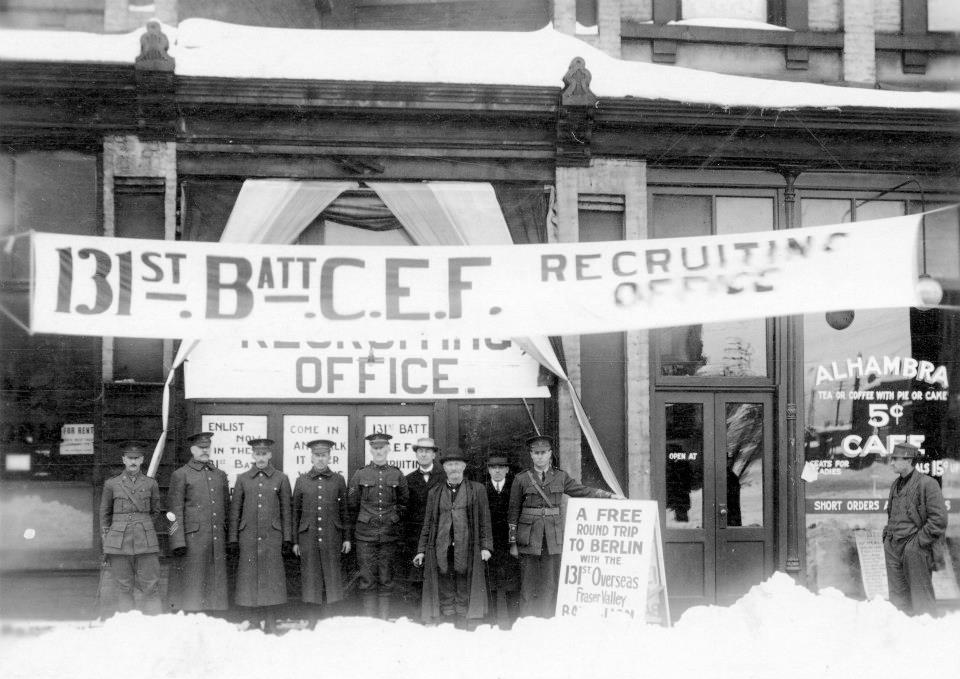
Vancouver City Archives
Soldiers sit on top of a truck, perhaps celebrating Armistice, the end of the First World War, on November 11, 1918. The Royal Union Flag is being waved, which was the official flag of Canada at the time.
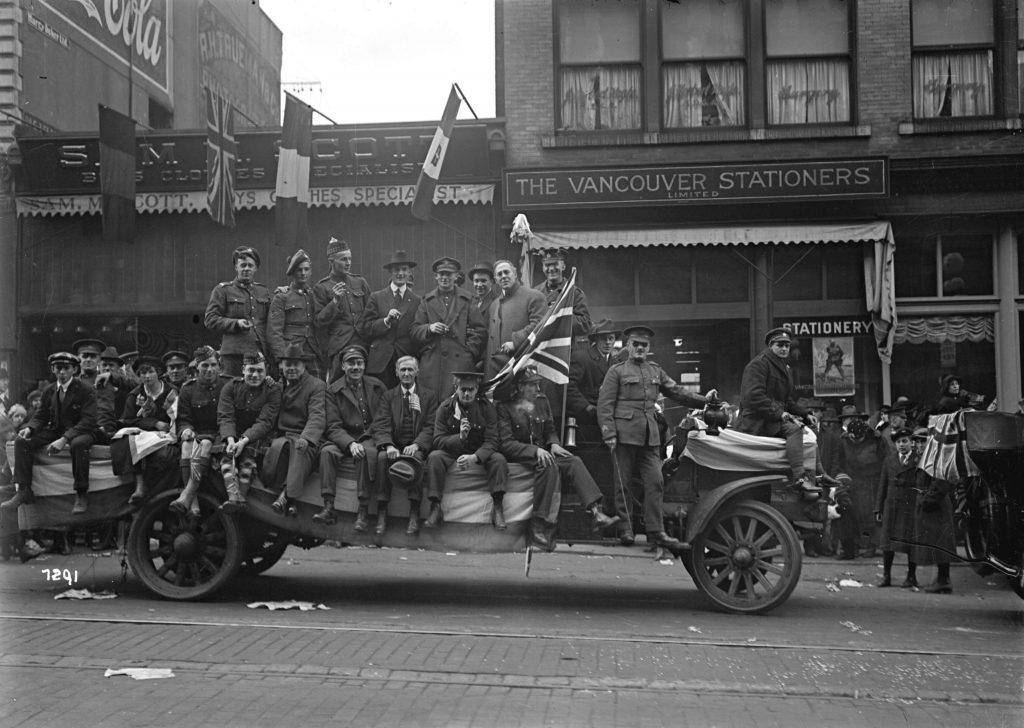
Vancouver City Archives
“Bonds Sinks U. Boats” – More Armistice Day celebrations on November 11, 1918. Location: Granville Street looking north from Georgia Street.
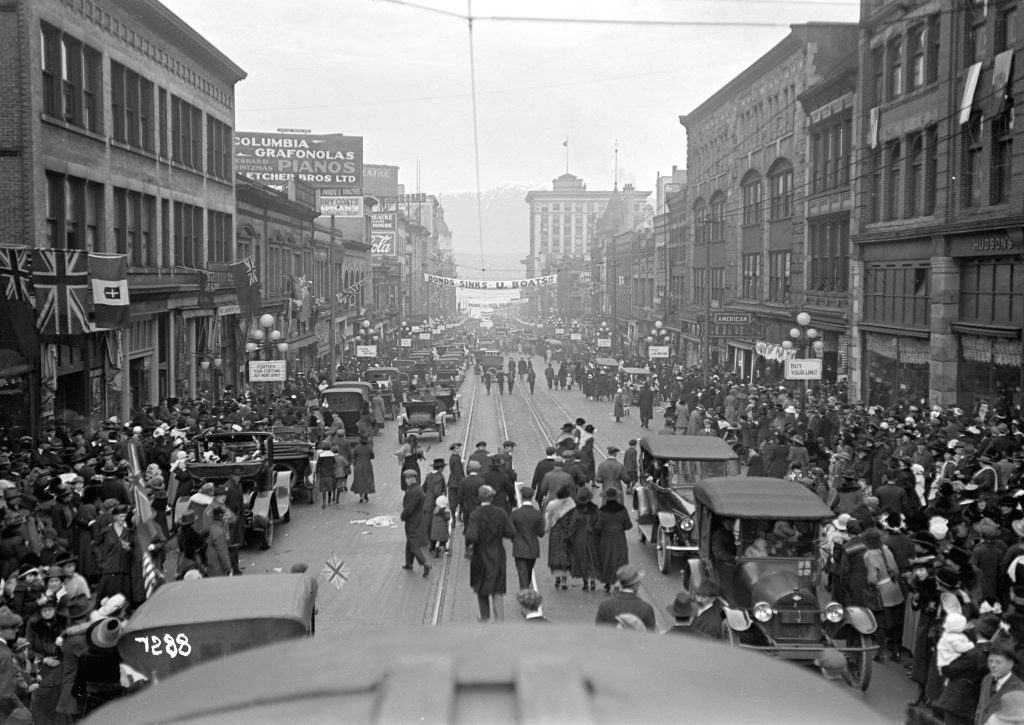
Vancouver City Archives
The Returned Soldiers Club, a group of WWI veterans, pose for a photograph in 1919. Many of the soldiers appear with obvious war amputations and wounds. Location: The Elysium Hotel at 1142 West Pender Street, the current site of the Shorehill Building office tower.
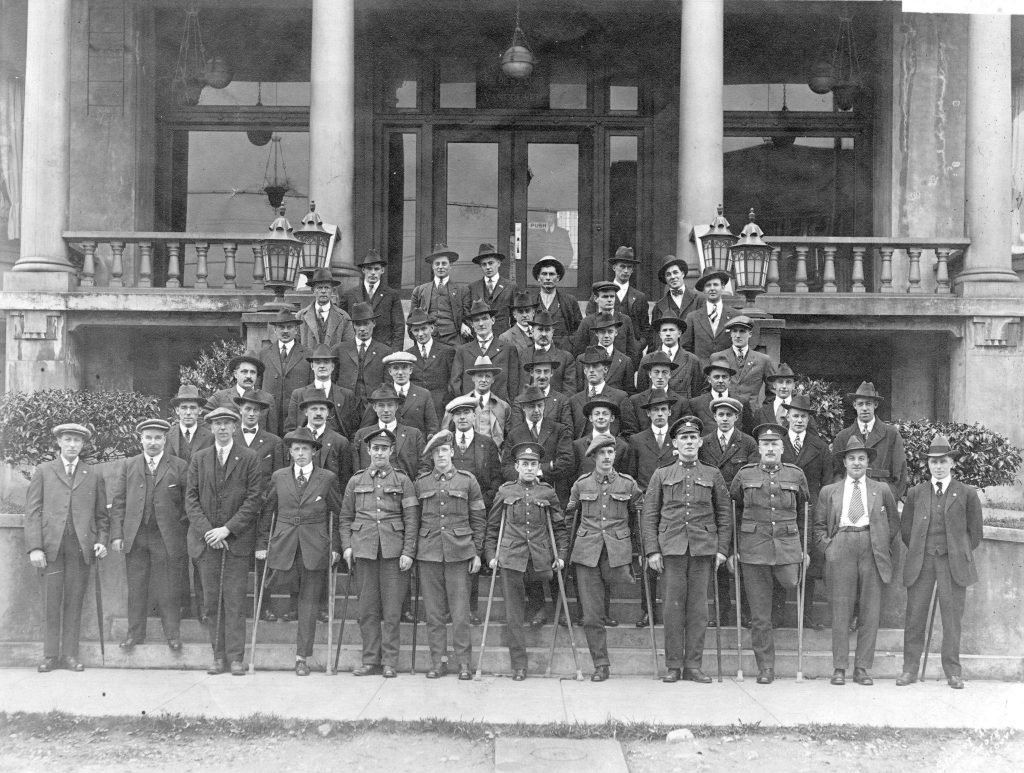
Vancouver City Archives
The Second World War
The most famous Canadian image during the Second World War – “Wait for me, Daddy!” – features a young boy chasing after his father, who is marching with the British Columbia Regiment, Duke of Connaught’s own rifles, down Eighth Street to a train in New Westminster, taken October 1, 1940.
Five-year-old Warren Bernard tugs away from his mother’s hand to reach out for his father, Private Jack Bernard. He eventually returned home safely at the end of the war, but he and his wife Bernice Bernard divorced.
During that time, the photo was used extensively for war-bonds fundraising campaigns and it was also featured in Life magazine, making Warren Bernard the poster-child for Canada’s involvement in the war.
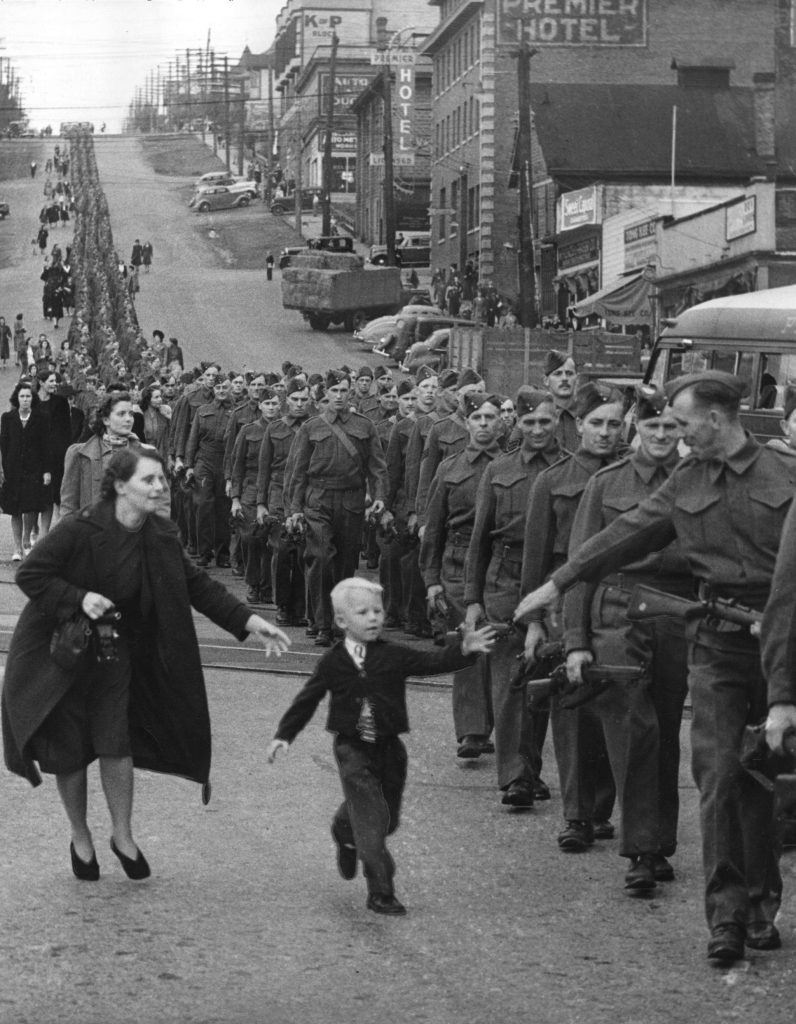
C.D. Detloff/ Vancouver City Archives
Nakoda First Nations people dressed in traditional attire purchase War Savings Stamps in 1940.
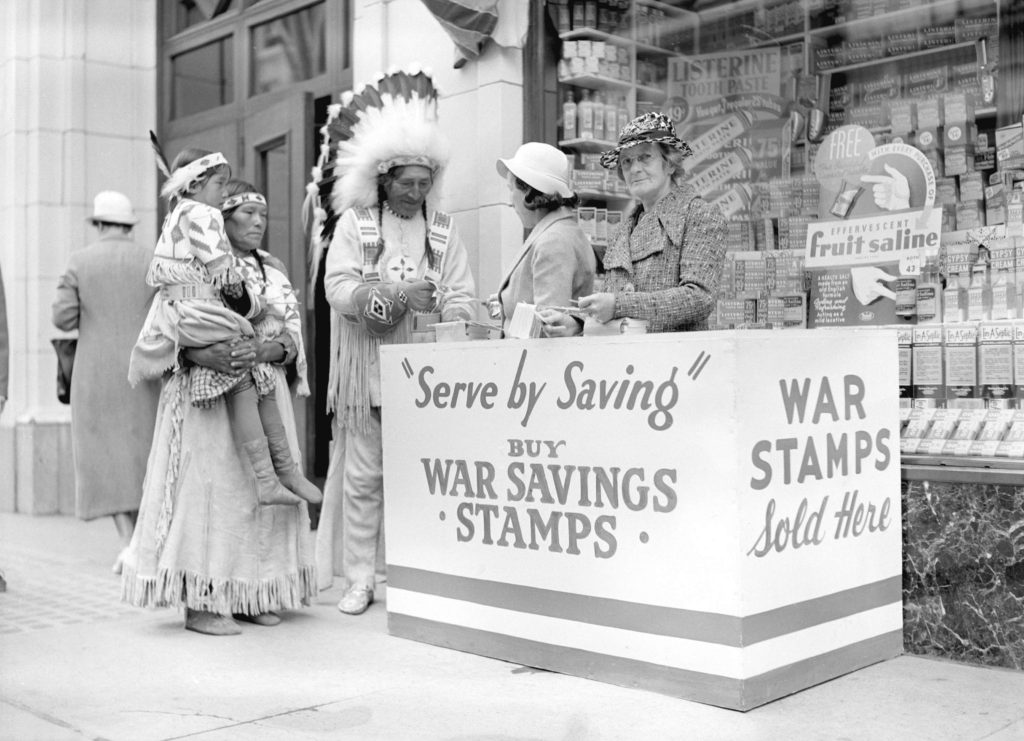
Vancouver City Archives
Troops say farewell to their loved ones as they embark on the train toward Europe at the start of the Second World War on April 14, 1942.
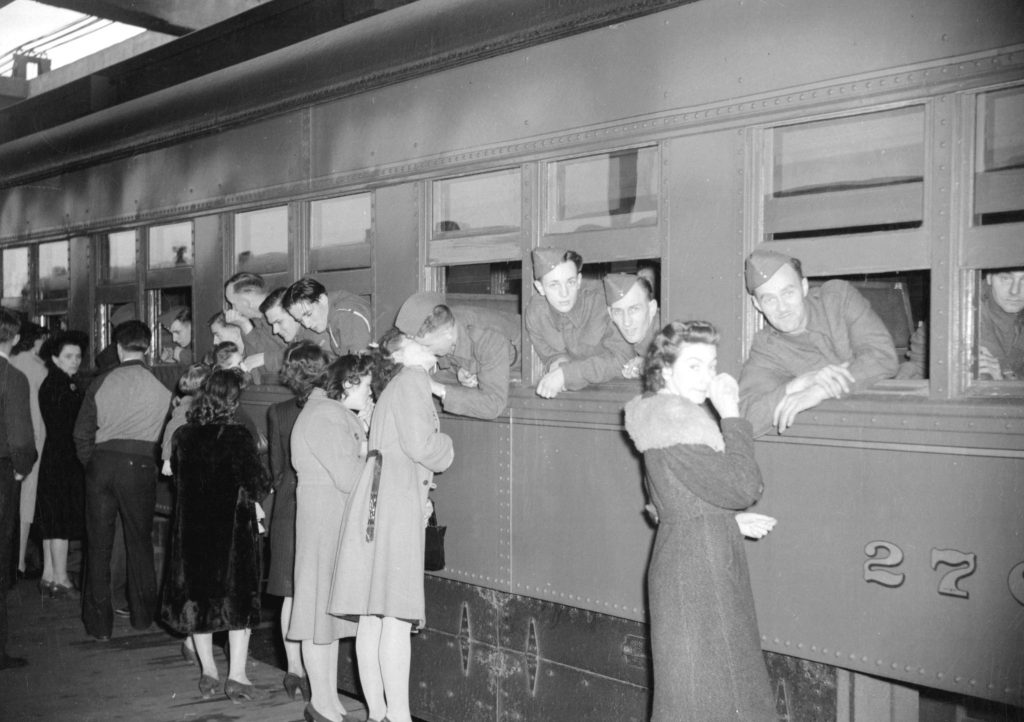
Vancouver City Archives
A father says goodbye to his wife and child while waiting to board a train on April 14, 1942.

Vancouver City Archives
Troops await departure aboard a ship bound for the front lines in 1942. The Marine Building, still standing, soars in the background. Location: The now-demolished Pier B-C, current location of Canada Place.

Vancouver City Archives
A Navy sailor gives much-needed blood to the Red Cross on board the H.M.C.S. Warrior sometime during World War 2.
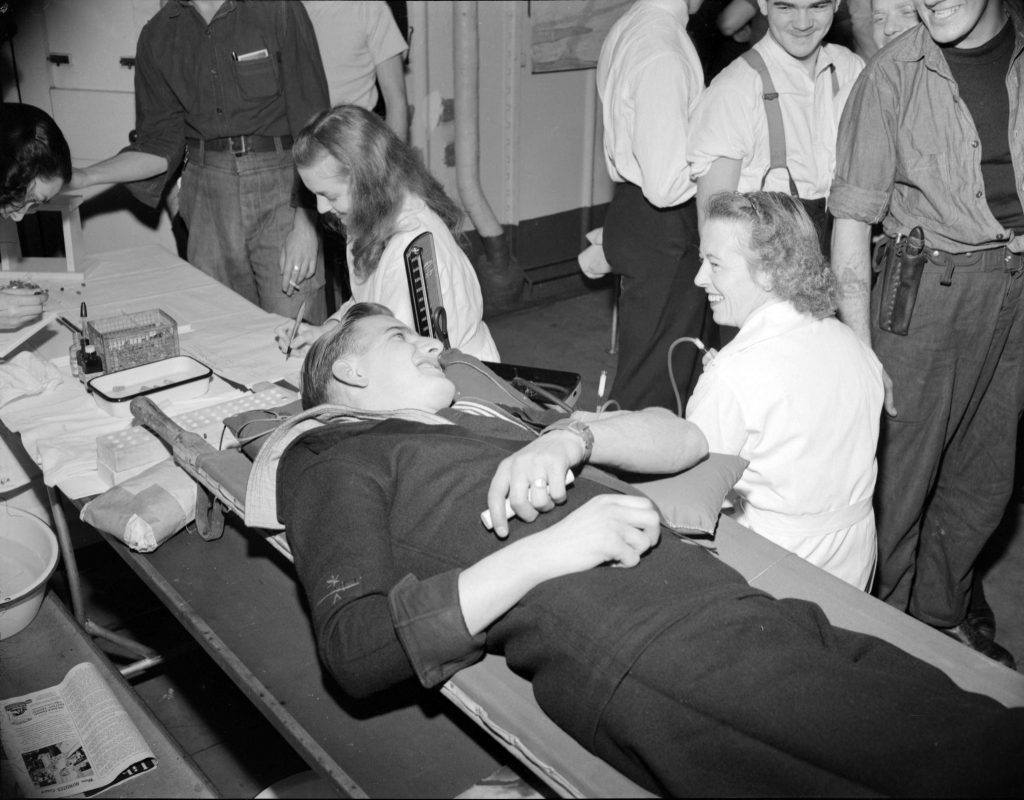
Vancouver City Archives
Inside a Japanese internment camp located at Hastings Park in 1942. The Japanese Canadians inside these camps lived in cold and unsanitary conditions. They were not legally allowed to work or attend school outside the camps and had all their property, including homes and fishing boats, confiscated. The government later liquidated all their belongings at auction, such as farm land, homes, clothing, fishing boats, bank deposits, stocks, and bonds.
Following the war, thousands were deported back to ravaged Japan, a country to which many had never even visited. It wasn’t until 1949 that Japanese Canadians were allowed to live without restrictions and 1950 that the government repaid $1.5 million in lost property to some 1,400 residents.
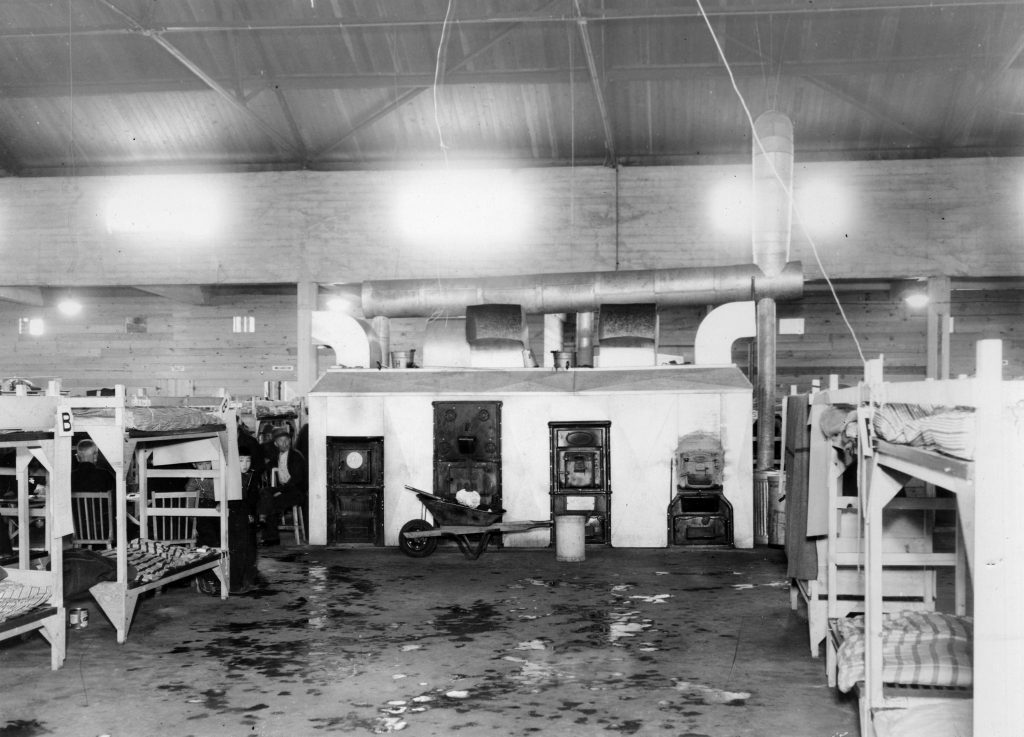
Vancouver City Archives
A notice issued from the BC Securities Commission to all people of Japanese ethnic origin residing in Vancouver during the war.
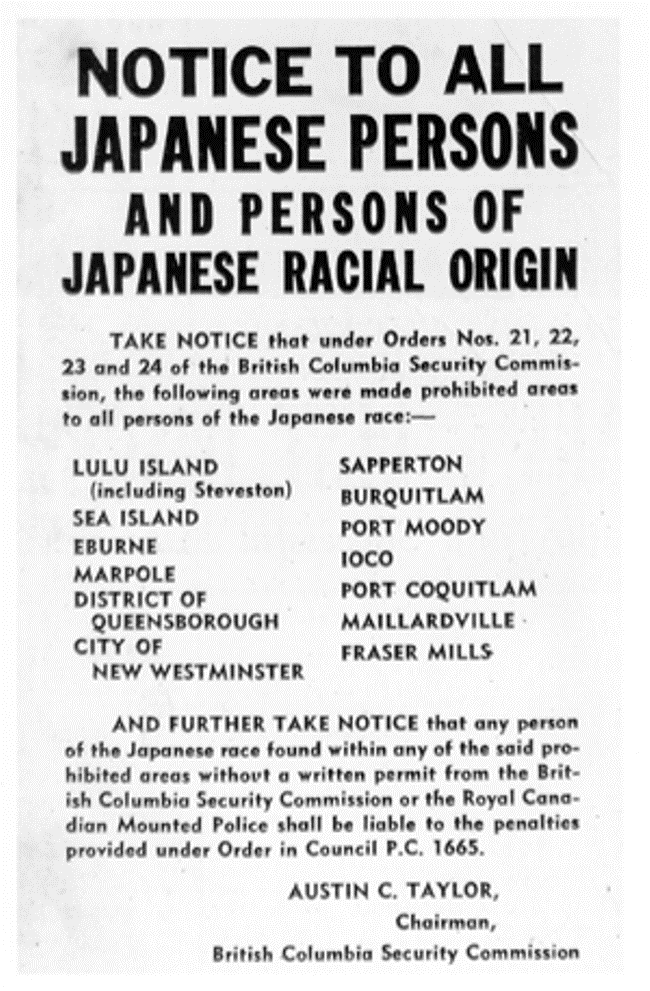
University of Washington Library
“War Ends in Europe”, “Germany Surrenders” – A news vendor sells copies of the Vancouver News-Herald on the morning of May 7, 1945, as news of the ceasefire reaches Canada. The next day, May 8, 1945 is officially known as Victory in Europe (V.E.) Day.
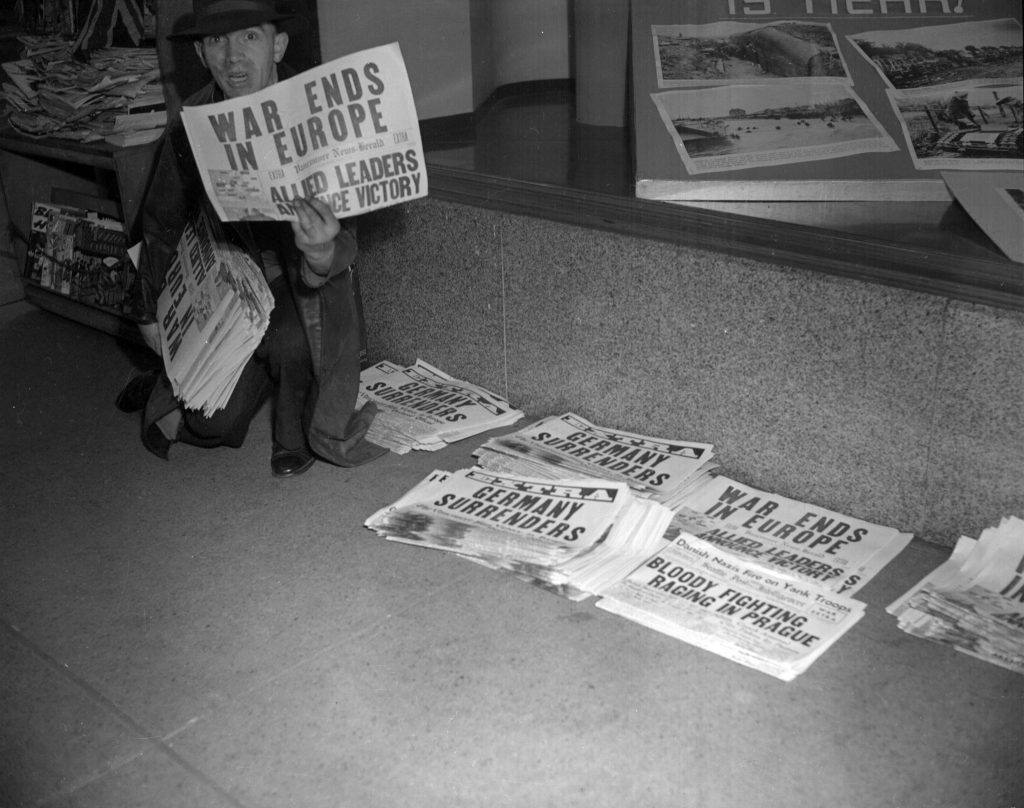
Vancouver City Archives
Military workers beam in joy while holding a copy of the Vancouver Daily Province’s May 7, 1945 edition, headlined “Vancouver goes wild as Germans surrender” and “Tuesday named V-E Day Holiday”. Location: Outside the Rogers Building, 470 Granville Street.
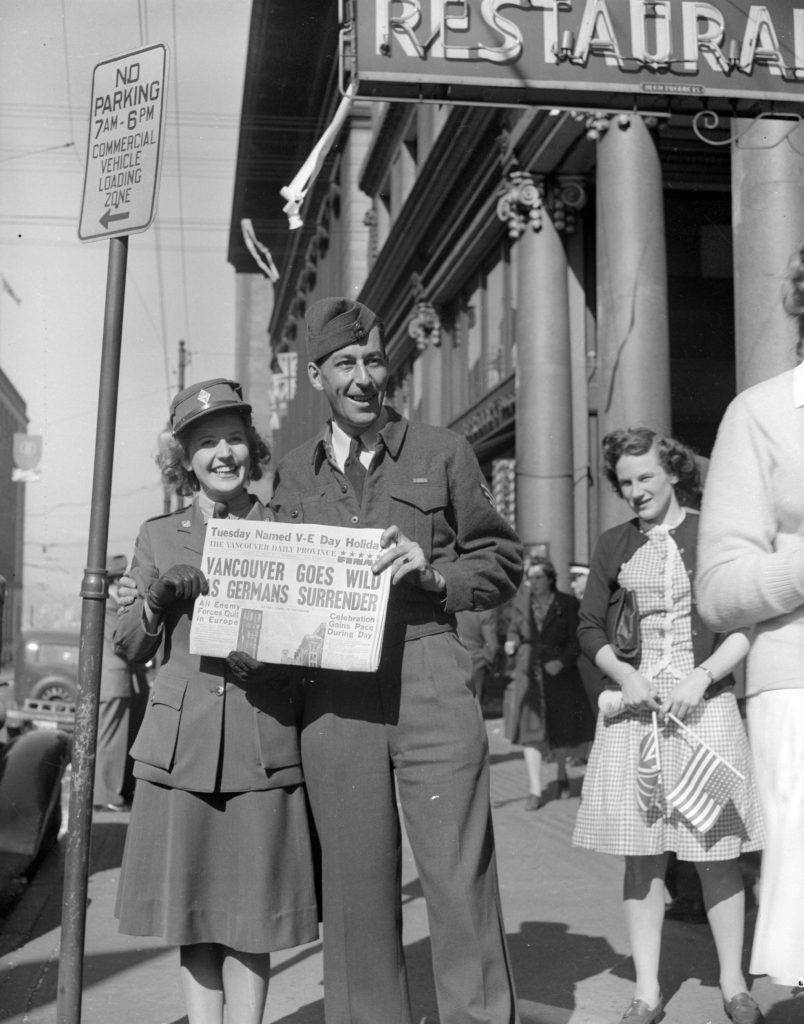
Vancouver City Archives
The city comes alive to rejoice the end of the war for V.E. Day celebrations. Location: Hastings Street at Granville.

Vancouver City Archives
An aerial view of V.E. Day celebrations, including plenty of confetti, on May 8, 1945. Location: Hastings Street.
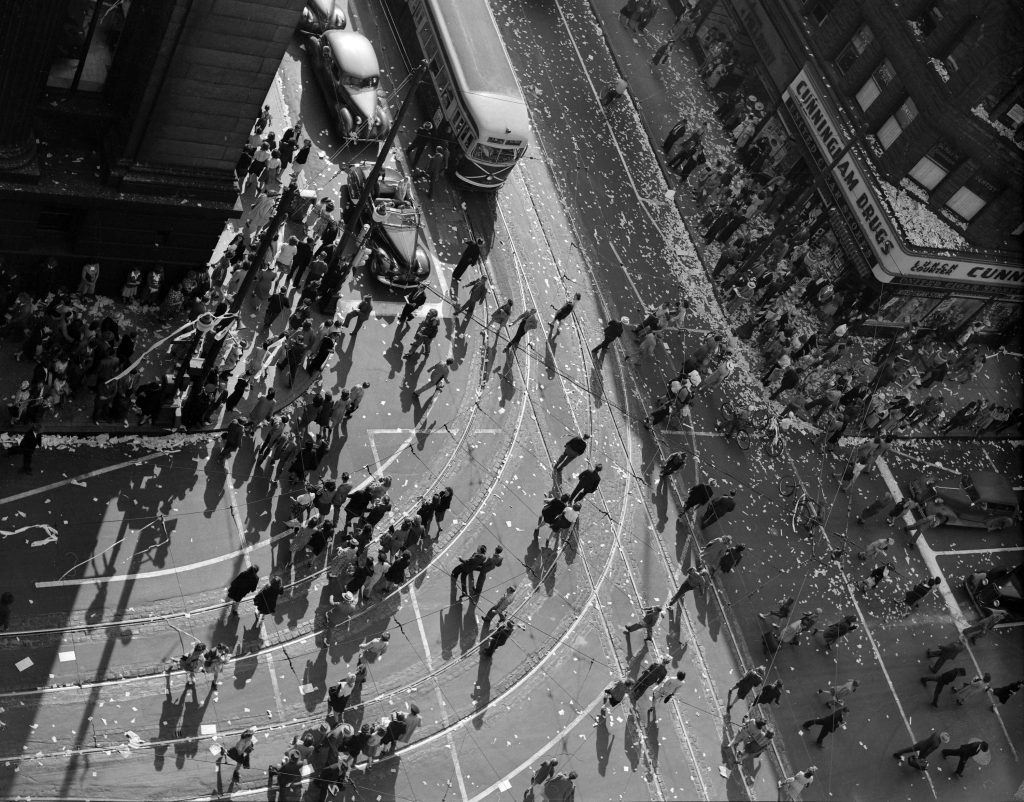
City of Vancouver Archives
Leftover revelry lines the streets after V.E. Day celebrations conclude. But the war is not over yet; the battle in the Pacific against Japan rages on. Location: Howe Street, looking north from Pender.

Vancouver City Archives
On August 14, 1945, Japan officially surrendered to the allies, ending the Asia-Pacific theatre of the Second World War, and the war as a whole – known as Victory in Japan (V.J.) Day. Vancouver’s Chinese community celebrated the win in the streets of Chinatown after a bloody and violent Japanese occupation of China.
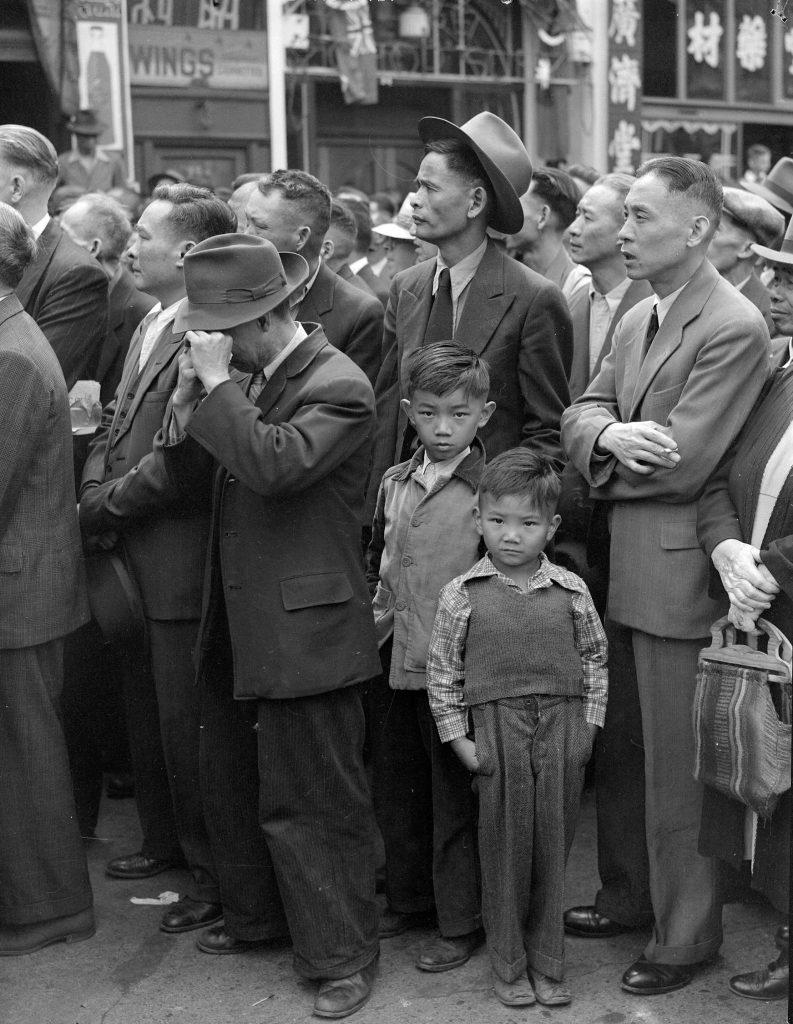
Vancouver City Archives

Vancouver City Archives
The front page of the Vancouver Sun on August 14, 1945, announcing the end of the Second World War.
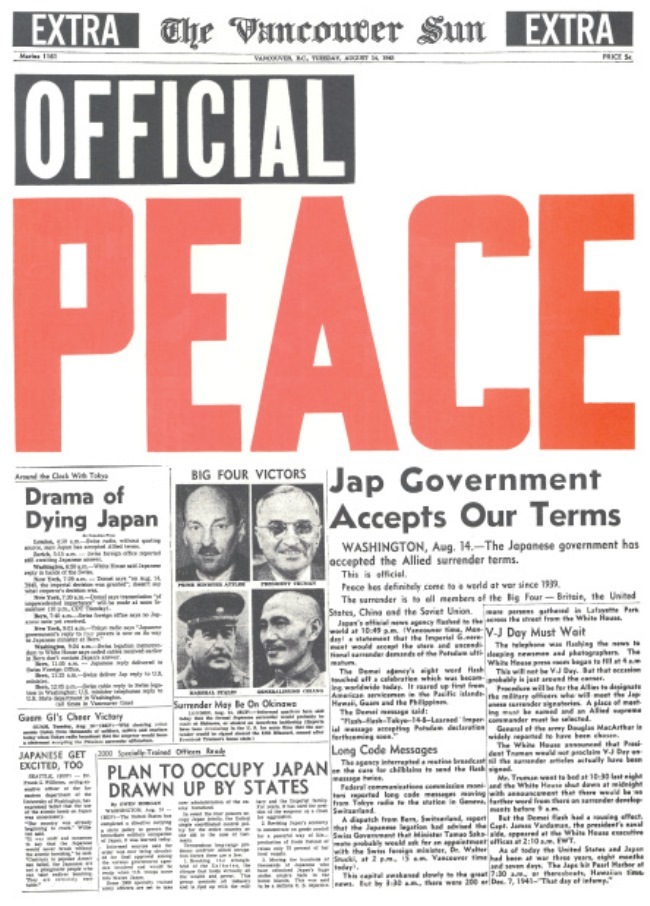
Vancouver Sun
See also
- TransLink releases special-edition Compass Cards for Remembrance Day
- 34 ceremonies in Metro Vancouver for Remembrance Day 2018
- Opinion: Here's why I'll be attending a Remembrance Day ceremony this year
- Opinion: I'm anti-war – but I'll still attend a Remembrance Day ceremony
- Over 3,000 poppies installed by students at Vancouver City Hall
- Millennials more likely to attend Remembrance Day events than anyone else in Canada

